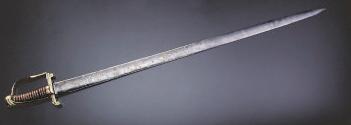| Theophilus Alte, a sword maker of Sollingen, Germany, wrote to Washington months later and told him that he made the sword which was supposed to be hand delivered to Washington by his son, Daniel. Alte also expressed hopes that the president, "as the only man I know…who acted in an uninterested manner for the happiness of his country," would protect his son in the United States. This sword has a steel blade and a copper and gold hilt, and is inscribed on the blade in German: “Destroyer of Despotism, Protector of Freedom, Determined man, take from my Son's hands, this sword, I pray thee, Theophilus Alte Sollingen.” It is now at the Mount Vernon Museum. There is no record of President Washington's reply. The fate of Alte's son was never discovered. John Quincy Adams was also one of the most famous translators of the works of Friedrich Schiller. Adams' book, 'Forty Four Letters About Germany' generated great interest in the German classics and literature. |
| There was one Solingen sword with a very uncertain or unusual provenance. On September 12th, 1796, George Washington wrote the note below to John Quincy Adams. |

| On September 10, 1785, a year before his death, 74 year old Friedrich the Great of Prussia sent an elegant dress sword to be hand- delivered to Washington as a gift with the oral message: "From the world's oldest General to the world's best General. Friedrich." The sword given to George Washington by Friedrich the Great was frequently worn by Washington on dress occasions and is represented in the famous 1834 portrait by Vanderlyn hanging in the United States House of Representatives. It was gravely damaged in a fire in the early 20th century. |
| Philadelphia, September 12, 1796 Dear Sir: To open a correspondence with you on so trifling a subject, as that which gives birth to this letter, would hardly be justified, were it not for the singularity of the case: this singularity will, I hope, apologize for the act. Some time ago, perhaps two or three months, I read in some gazette, but was so little impressed with it at the time (conceiving it to be one of those things which get into newspapers nobody knows how or why) that I cannot now recollect whether the gazette was of American or foreign production, announcing that a celebrated artist had presented, or was about to present to the President of the United States a sword of masterly workmanship, as an evidence of his veneration etc. etc. I thought no more of the matter afterwards, until a gentleman with whom I have no acquaintance, coming from and going to I know not where, at a tavern I never could get information of, came across this sword (for it is presumed to be the same) pawned for thirty dollars; which he paid, left it in Alexandria, nine miles from my house, in Virginia, with a person who refunded him the money and sent the sword to me. This is all I have been able to learn of this curious affair. The blade is highly wrought, and decorated with many military emblems. It has my name engraved thereon, and the following inscription (translated from the Dutch): “Condemner of despotism, Preserver of Liberty, glorious man, take from my sons hands this Sword, I beg you. A. Sollingen.” The hilt is either gold, or richly plated with that metal; and the whole carries with it the form of an horseman’s sword, or long sabre. The matter, as far as it appears at present, is a perfect enigma. How it should have come into this country without a letter, or an accompanying message: how afterwards it should have got into such loose hands; and whither the person having it in possession was steering his course, remains as yet to be explained; some of them, probably, can only be explained by the maker; and the maker no otherwise to be discovered than by the inscription and name, “A. Sollingen,” who, from the impression which dwells on my mind, is of Amsterdam. If, Sir, with this clew you can develope the history of this sword, the value of it; the character of the maker, and his probable object in sending it; it would oblige me; and, by relating these facts to him might obviate doubts, which otherwise might be entertained by him of its fate, or its reception. With great esteem, etc. G. Washington |
| Sword Stories |